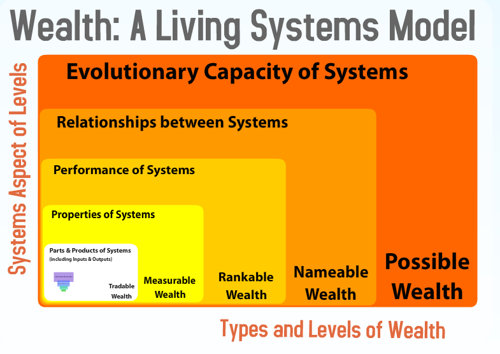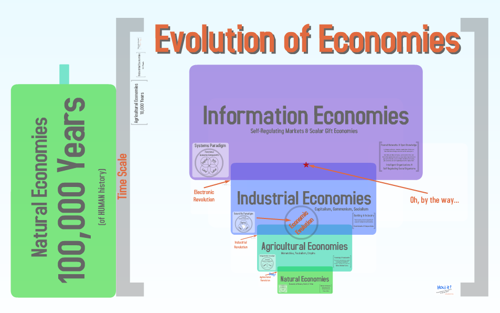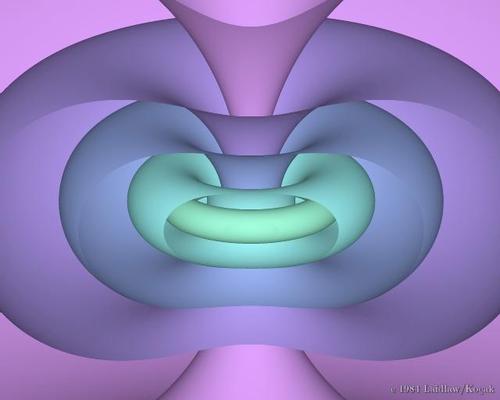Eschelon
We have developed a number of pictures/models to describe the kinds of wealth created by systems. These models inevitably involve nested elements pictured as circles within circles (or boxes in boxes). To quote Dewey, this is not like marbles in a box, but like events are in a history. We are calling these levels "eschelons" both to indicate this sort of containment by the whole, and that within each exchelon many levels and kinds of expressive capacity will arise as well.
This is a source document: Art's Prezi, and several key images below show the inside out view, that is before The Systems Flip.
Systems Wealth

Economic Wealth

Levels of Wealth
Wealth in a Nutshell
Wealth is access to well-being. There are at least three levels of wealth:

- Tradable Wealth: Food, shelter, services, time, are all forms of tradable wealth. We are all familiar with tradable wealth--it is the stuff we need and want, the resources that we compete for. Things we can trade are the products or the components of systems.
- Measurable Wealth: My health is non-tradable--I can't give it to you. I can give you my blood, which may affect both of our health, but I can't give you my health itself. It is a property of my body as a whole. However, you can measure my health in lots of objective ways: the miles I run or the number of times I see a doctor. Another thing that is non-tradable is the productive capacity of a factory. I can sell you the products of the factory, or the factory itself, but not its productive capacity. But you can measure its productivity by comparing its output to the inputs it requires. Similarly the health of a forest is non-tradable. Its diversity, resilience, etc. can, as with bodily health and productive capacity, be affected and objectively measured, but it can't be traded. Bodies, factories, and forests are all examples of systems. Things we can measure but not trade are properties of systems as a whole.
- Acknowledgeable Wealth: Friendship, beauty, freedom, civility, culture, happiness, integrity, reputation--these are all forms of acknowledgeable wealth. They are neither tradable nor objectively measurable because their impact is only felt subjectively. I can have friendships of different strengths--from an acquaintance to a best buddy--and though I can tell the qualitative difference between them, that difference is not measurable using any external scale. Rather, it is a difference in quality of relationship between one system (me) and two other systems (my acquaintance, and my buddy). Similarly my professional reputation comes from my relationships with my previous clients. As a potential client you can get a subjective sense of my reputation by talking to my previous clients, but there is no one objective standard to go by in making your choice. Those things that we can acknowledge but cannot measure or trade are inter-systemic resonances.
These levels of wealth are interdependent. Many communities are resource-poor but health- and culture-rich, but this is only possible up to a point: at some point lack of resources will degrade health and culture. Communities that are resource-rich but don't maintain their other levels of wealth will eventually degrade their capacity to maintain their tradable wealth.
Another Possible Form for Illustrating the Levels
